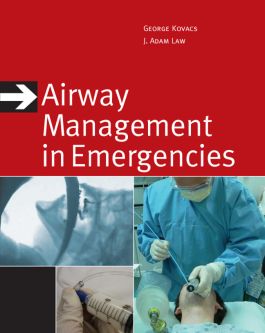Airway Management in Emergencies
Step 1. Download Adobe Digital Editions Both PC and Mac users will need to download Adobe Digital Editions to access their eBook. You can download Adobe Digital Editions at Adobe's website here.
Step 2. Register an Adobe ID if you do not already have one. (This step is optional, but allows you to open the file on multiple devices) Visit account.Adobe.com to register your Adobe account.
Step 3: Authorize Adobe Digital Editions using your Adobe ID. In Adobe Digital Editions, go to the Help menu. Choose “Authorize Computer.”
Step 4: Open your file with Adobe Digital Editions. Once you’ve linked your Adobe Digital Editions with your Adobe ID, you should be able to access your eBook on any device which supports Adobe Digital Editions and is authorized with your ID. If your eBook does not open in Adobe Digital Editions upon download, please contact customer service
1. Definitive Airway Management2. Airway Physiology and Anatomy3. Oxygen Delivery and Bag-Mask Ventilation4. Supraglottic Rescue Devices5. Direct Laryngoscopy and Intubation6. Alternative Intubation Techniques7. Surgical/Trans-tracheal Access to the Airway8. Airway Assessment and Intubation Choices9. How To Do Awake Intubations10. Rapid Sequence Intubation11. The Difficult and Failed Airway12. Airway Pharmacology13. Post Intubation Care14. The Critically Ill Patient15. Cardiovascular Emergencies16. Respiratory Emergencies17. Central Nervous System Emergencies18. Prehospital Airway Management19. Age considerations20. Human Performance and Patient Safety
3. Oxygen Delivery and Bag-Mask Ventilation4. Supraglottic Rescue Devices5. Direct Laryngoscopy and Intubation6. Alternative Intubation Techniques7. Surgical/Trans-tracheal Access to the Airway8. Airway Assessment and Intubation Choices9. How To Do Awake Intubations10. Rapid Sequence Intubation11. The Difficult and Failed Airway12. Airway Pharmacology13. Post Intubation Care14. The Critically Ill Patient15. Cardiovascular Emergencies16. Respiratory Emergencies17. Central Nervous System Emergencies18. Prehospital Airway Management19. Age considerations20. Human Performance and Patient Safety
5. Direct Laryngoscopy and Intubation6. Alternative Intubation Techniques7. Surgical/Trans-tracheal Access to the Airway8. Airway Assessment and Intubation Choices9. How To Do Awake Intubations10. Rapid Sequence Intubation11. The Difficult and Failed Airway12. Airway Pharmacology13. Post Intubation Care14. The Critically Ill Patient15. Cardiovascular Emergencies16. Respiratory Emergencies17. Central Nervous System Emergencies18. Prehospital Airway Management19. Age considerations20. Human Performance and Patient Safety
7. Surgical/Trans-tracheal Access to the Airway8. Airway Assessment and Intubation Choices9. How To Do Awake Intubations10. Rapid Sequence Intubation11. The Difficult and Failed Airway12. Airway Pharmacology13. Post Intubation Care14. The Critically Ill Patient15. Cardiovascular Emergencies16. Respiratory Emergencies17. Central Nervous System Emergencies18. Prehospital Airway Management19. Age considerations20. Human Performance and Patient Safety
9. How To Do Awake Intubations10. Rapid Sequence Intubation11. The Difficult and Failed Airway12. Airway Pharmacology13. Post Intubation Care14. The Critically Ill Patient15. Cardiovascular Emergencies16. Respiratory Emergencies17. Central Nervous System Emergencies18. Prehospital Airway Management19. Age considerations20. Human Performance and Patient Safety
11. The Difficult and Failed Airway12. Airway Pharmacology13. Post Intubation Care14. The Critically Ill Patient15. Cardiovascular Emergencies16. Respiratory Emergencies17. Central Nervous System Emergencies18. Prehospital Airway Management19. Age considerations20. Human Performance and Patient Safety
13. Post Intubation Care14. The Critically Ill Patient15. Cardiovascular Emergencies16. Respiratory Emergencies17. Central Nervous System Emergencies18. Prehospital Airway Management19. Age considerations20. Human Performance and Patient Safety
15. Cardiovascular Emergencies16. Respiratory Emergencies17. Central Nervous System Emergencies18. Prehospital Airway Management19. Age considerations20. Human Performance and Patient Safety
17. Central Nervous System Emergencies18. Prehospital Airway Management19. Age considerations20. Human Performance and Patient Safety
19. Age considerations20. Human Performance and Patient Safety
Learn the clinical skills necessary to treat any emergency airway problem
Written by international experts in a style that's concise, practical and to the point, Airway Management in Emergencies covers all the options-both medical and surgical-for managing any patient's airway in an emergency. Here, you'll find the core knowledge and accompanying management protocols necessary to assess, oxygenate, intubate, and monitor patients requiring emergency airway management.
In each chapter, this high-yield coverage is supported by evidence-based algorithms, synoptic tips, and real-world case studies that show you how to resolve any difficult airway scenario you would likely encounter in clinical practice.
Features
- Highlighted key points in each chapter
- Skill-sharpening review of “core knowledge”
- Over 100 figures that include a combination of original art work, fluoroscopy and Airwaycam® images.
- A practical overview of both established and newer emergency airway equipment
- Far-reaching coverage addressing both the anticipated and unanticipated difficult airway, the uncooperative patient, and the 'failed' airway.
- Chapters on treating a range of patient populations and clinical presentations including an approach to the pediatric, the elderly, and the critically ill patient
- Perspectives on when and how to perform both 'awake' and rapid sequence intubations and effectively administer post-intubation care
- A closing chapter on the interrelationship between human performance and patient safety-and how to optimize both in caring for patients requiring acute airway management

